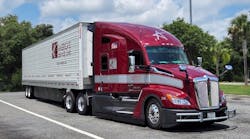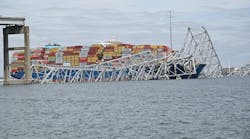TransCore's 2009 Broker Benchmark Survey shows declines across the board-- reflecting current economic conditions and their impact on the freight market—but the margin drop is the big surprise/
Tom Heine, president of Aljex Software and a former freight broker, said the survey is merely reflecting the climate. "I think that for the most part it seems kind of common sense," Heine told Fleet Owner, pointing right to the ratio of freight loads to available trucks, which dropped from 6.39 in June 2008 to 0.82 in January of this year. That's the first time since 2002 it has been that low.
David Schrader, senior vp of operations for the Freight Services Group at TransCore, though, suggested not reading too much into the ratio of freight loads. "It's certainly low, but you get a hugely cyclical market in the U.S. with a lot more freight in the summer months," he said. "The drop is pronounced, but if the freight was flat, that would [represent] a much bigger drop."
TransCore's 2009 Broker Benchmark Survey shows declines across the board-- reflecting current economic conditions and their impact on the freight market—but the margin drop is the big surprise/
Tom Heine, president of Aljex Software and a former freight broker, said the survey is merely reflecting the climate. "I think that for the most part it seems kind of common sense," Heine told Fleet Owner, pointing right to the ratio of freight loads to available trucks, which dropped from 6.39 in June 2008 to 0.82 in January of this year. That's the first time since 2002 it has been that low.
David Schrader, senior vp of operations for the Freight Services Group at TransCore, though, suggested not reading too much into the ratio of freight loads. "It's certainly low, but you get a hugely cyclical market in the U.S. with a lot more freight in the summer months," he said. "The drop is pronounced, but if the freight was flat, that would [represent] a much bigger drop."
Schrader pointed to the year-over-year tonnage figures as a more accurate gauge of the marketplace. According to the survey, which covered 2008, year-over-year tonnage declined 12.5% from December 2007 to December 2008 and there were 3,065 trucking company failures in 2008, removing 137,650 trucks from service.
"I think when you don't have enough freight, trucks just keep dropping their prices until they go out of business," Aljex's Heine said.
But a key indicator in this survey is the slip in gross margins, dropping 5% from 16.6% to 15.8%. Routes between 200 and 500 miles long maintained the highest margin, at 15.9%, with 501-1,000 miles at 13.9% and routes over 1,000 miles at 12.8%.
"[Brokers] really have to run extremely tight to make a profit," Heine said. "It's huge. That 5% could be the difference between making a profit and losing money."
The margin decline is the only real surprise in the survey, Schrader said. "The fact that margins declined is a bit of a surprise," he said, adding that the expectation is if there are fewer trucks to haul the freight, the marketplace would logically dictate more competition for loads and therefore higher rates.
Schrader, in speaking with Fleet Owner, mentioned that the big broker issue of last summer, the transparency, or the perceived lack thereof, of fuel surcharges, didn't show up in this survey.
"If [brokers] were holding back fuel surcharges, you would expect margins to be higher," Schrader said. "When it comes to margins, supply and demand plays a huge role. Yes there are other factors, but supply and demand plays the biggest role."
According to the survey, 39% of companies planned no change in practices in 2009. For 2008, 31% cut costs, 30% cut jobs and 13% did both. Eleven percent of the companies surveyed said they added salesman or agents, 8% improved operational efficiency and 7% tightened credit controls. Broker-carriers were more likely to institute layoffs while brokers were more likely to continue current practices, cut costs or add personnel.
"We had 61% that said they were making cost cuts, but what was interesting was pure brokers, those without any trailers, were adding salespeople, indicating they were looking to add freight," said Ken Harper, senior marketing and communications manager at TransCore.
Loads types remained relatively unchanged from 2007 with 80% truckload and 14% LTL. The only significant difference was in intermodal, which dipped from 5% of all loads to 3.5%. Schrader mentioned that one carrier type survived a little better than its dry freight counterparts. "Reefer carriers seemed to do pretty well last year because people still have to eat," he said.
Customer relations remained important, with 55% of business considered repeat and 26% more contract-based. Only 4% of the loads came from exception or overflow freight and 12% from the spot market.
While the numbers might seem a little depressing, particularly the number of carriers that left the market in 2008, conversely the figures may indicate that the businesses remaining are well positioned for the future.
"The remaining businesses out there are going to be in a great position from a price control perspective," Schrader said. "Capacity is going to be tight, so they are going to be much healthier businesses."
The survey was completed in early March, so both Harper and Schrader believe the figures are a good representation of the current marketplace. Still, Schrader indicated TransCore is starting to see some upward movement of late.
"We saw a decent uptick in March," he said. "We weren't at levels we were at last year at this time…but we saw an uptick in March, and anecdotally, it seems to be improving in April."
The survey was sent to 5,000 freight brokerage companies and 3PLs, with 420 responding. Of those, 47% were brokers and 35% broker-carriers with just 11% 3PLs.




